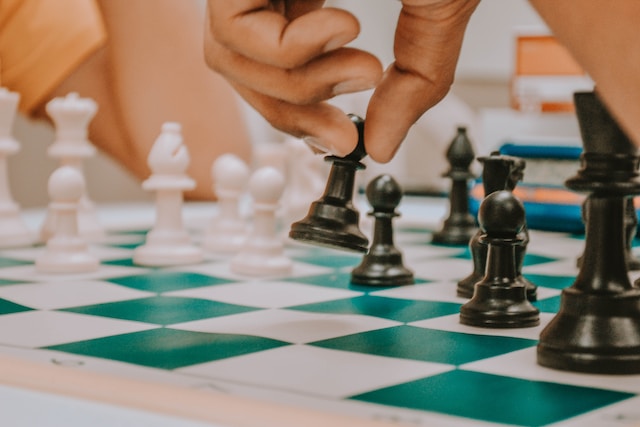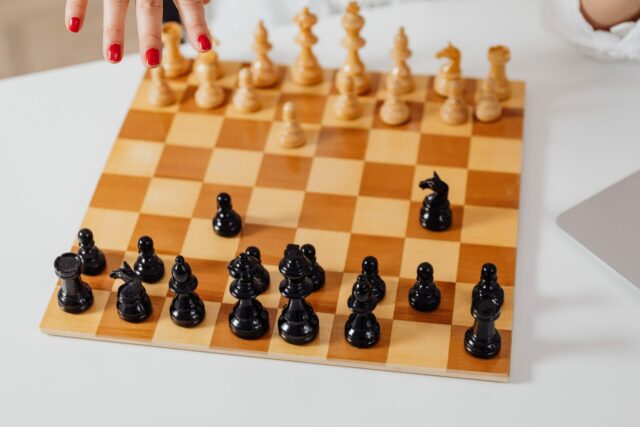Chess, the captivating game of strategy and intellect, has enthralled countless players throughout history. While mastering the art of chess requires dedication and practice, it is equally crucial to identify and steer clear of common mistakes that can hinder your progress.
In this article, we delve into the intriguing world of chess and reveal some of the most prevalent blunders to avoid. By understanding these pitfalls, you’ll be one step closer to outsmarting your opponents and claiming victory on the chessboard.
How can you prevent falling into the “Pawn Push” trap?
Beware of the allure of pushing pawns too eagerly in the opening phase of the game. While advancing pawns can gain space and initiate attacks, it’s essential to maintain a balance and not fall into the “Pawn Push” trap.
Rushing pawn moves without considering their long-term implications can weaken your position and leave vulnerabilities in your defense. Instead, focus on developing your pieces harmoniously and strategically, making sure to evaluate the consequences of each pawn push carefully.
Are you neglecting the importance of piece coordination?
Chess is not just about individual pieces; it’s about their coordination and harmonious cooperation. Neglecting piece coordination can lead to missed opportunities and inefficiencies on the chessboard.
Each piece should have a specific role and contribute to the overall plan. Take the time to assess how your pieces work together and consider their potential combinations and support. By prioritizing piece coordination, you’ll unlock new tactical possibilities and increase your chances of success.
What are the dangers of premature piece development?
Haste in developing your pieces can be detrimental to your game. Premature piece development refers to the early and reckless deployment of your forces without proper consideration of the position and potential threats.
It can leave your pieces vulnerable to attacks and limit their mobility. Instead, aim for a balanced approach, developing your pieces strategically while ensuring their safety. Patiently assess the position, anticipate your opponent’s plans, and only advance your pieces when the timing is right.
Is castling always the right move?

Castling, a fundamental chess move, is often considered a safe and prudent choice. However, blindly assuming that castling is always the right move can be a grave mistake. While castling provides king safety and connects the rooks, there are situations where it may not be the best option.
Factors such as the position of your opponent’s pieces, pawn structure, and potential tactical opportunities should be carefully evaluated before committing to castling. Stay flexible and be willing to adapt your plans accordingly.
How to avoid the “Tactical Tunnel Vision”?
Focusing solely on tactical opportunities without considering the broader aspects of the position can lead to tunnel vision, narrowing your perspective and missing critical strategic moves. While tactics play a vital role in chess, it’s crucial to maintain a balance between tactics and strategy.
Take the time to assess the positional aspects, evaluate long-term plans, and anticipate your opponent’s counterplay. By expanding your vision beyond pure tactics, you’ll gain a deeper understanding of the game and make more informed decisions.
Are you underestimating the power of the center?
The center of the chessboard holds immense strategic significance. Underestimating its importance can deprive you of crucial advantages. The central squares provide control, mobility, and options for your pieces.
By placing your pawns and developing your pieces towards the center, you secure a solid foundation for future plans and attacks. Respect the power of the center and strive to establish your presence there, denying your opponent the same privilege.
What are the consequences of neglecting pawn structure?
The seemingly humble pawns play a crucial role in chess, and neglecting their structure can have severe consequences. Pawn structure determines the nature of the position, affecting piece activity, mobility, and the potential for pawn breaks.
Failing to pay attention to pawn structure can result in weaknesses, isolated pawns, and compromised piece coordination. Study and understand different pawn structures, adapt your plans accordingly, and exploit weaknesses in your opponent’s pawn formation.
Is neglecting opponent’s threats costing you the game?
In the heat of the battle, it’s easy to become so focused on your own plans that you overlook your opponent’s threats. Neglecting your opponent’s moves and potential counterattacks can cost you dearly.
Always be alert and consider the consequences of your opponent’s moves. Take the time to evaluate their threats, anticipate their ideas, and actively defend your position. By being mindful of your opponent’s plans, you’ll avoid falling into traps and maintain a solid defense.
How to overcome the temptation of unnecessary exchanges?

Exchanging pieces can be tempting, especially when presented with an opportunity. However, giving in to the temptation of unnecessary exchanges without assessing the consequences can hinder your progress.
Each exchange alters the balance of power on the board and has implications for the rest of the game. Instead of hastily exchanging pieces, carefully weigh the advantages and disadvantages of each exchange. Preserve pieces that contribute to your strategic plans and consider exchanges that benefit your position in the long run.
Are you falling prey to the “King Safety” trap?
Is your king vulnerable to potential attacks? Neglecting the safety of your king can lead to devastating consequences. Protecting your king should be a top priority throughout the game.
Properly positioning your pieces, securing pawn shields, and timely castling contribute to your king’s safety. Don’t let your guard down; be proactive in fortifying your king’s defenses to avoid falling into the dangerous “King Safety” trap.
What are the pitfalls of overcomplicating the game?
Chess is a game of complexity, but there is a fine line between strategic depth and overcomplication. Are you making the game unnecessarily convoluted? Overthinking moves and getting lost in intricate variations can lead to poor decisions and missed opportunities.
Simplicity can be a powerful tool. Focus on fundamental principles, evaluate key elements of the position, and aim for clarity in your plans. By avoiding the pitfalls of overcomplicating the game, you’ll enhance your understanding and make more effective moves.
Are you underestimating the significance of endgame principles?
The endgame, often neglected or underestimated, holds immense importance in chess. Are you disregarding endgame principles and missing out on crucial victories?
Studying endgames and mastering fundamental concepts such as king and pawn endgames, piece activity, and zugzwang can give you a significant edge. Don’t assume the game is won in the middlegame; respect the endgame and develop your skills to capitalize on opportunities when the board thins out.
How to prevent the “Time Trouble” nightmare?
Do you find yourself scrambling against the clock, making hasty and inaccurate moves? Time trouble can turn the game into a nightmare, eroding your position and blurring your judgment. Effective time management is key.
Allocate your time wisely, prioritize moves based on their importance, and refrain from unnecessary calculations during critical moments. Practice time management techniques to maintain composure and make well-considered decisions, even under time constraints.
Are you disregarding the value of studying classic games?

In the pursuit of chess improvement, are you neglecting the treasure trove of knowledge hidden within classic games? Studying the games of past masters can provide valuable insights into strategic ideas, tactical patterns, and positional nuances.
Embrace the richness of chess history and analyze the timeless battles fought by renowned players. By immersing yourself in classic games, you’ll expand your repertoire, refine your understanding, and develop a deeper appreciation for the art of chess.
What are the common mistakes made in analyzing the game post-match?
| Mistake | Consequences | Prevention |
|---|---|---|
| Falling into the “Pawn Push” trap | Weakening of position and vulnerabilities in defense | Balance pawn advancement with careful consideration of long-term implications |
| Neglecting piece coordination | Missed opportunities and inefficiencies on the chessboard | Focus on harmonious cooperation between pieces and evaluate potential combinations |
| Premature piece development | Vulnerable pieces and limited mobility | Develop pieces strategically, considering the position and potential threats |
| Blindly assuming castling is always right | Missed tactical opportunities and compromised king safety | Evaluate position, opponent’s pieces, and potential tactical possibilities before committing to castling |
| Overcomplicating the game | Poor decision-making and missed opportunities | Favor simplicity, focus on fundamental principles, and evaluate key elements of the position |
After the game concludes, the analysis stage offers an opportunity for growth, but it’s essential to avoid common mistakes that hinder progress. Are you falling into traps during post-match analysis? Some pitfalls include relying solely on engine evaluations, neglecting subjective assessments, overlooking critical moments, and failing to consider alternative moves.
Approach the analysis with an open mind, incorporate both objective and subjective evaluations, identify key turning points, and learn from your mistakes. By avoiding these common mistakes, you’ll extract valuable lessons and accelerate your chess development.
Final thoughts
In the vast world of chess, avoiding common mistakes is crucial for improving your game and achieving success. By steering clear of the “Pawn Push” trap, prioritizing piece coordination, considering the dangers of premature piece development, and making informed decisions about castling, you can establish a solid foundation for strategic play.
Additionally, avoiding the pitfalls of “Tactical Tunnel Vision,” recognizing the power of the center, understanding the significance of endgame principles, and managing your time effectively will enhance your overall performance. Don’t overlook the value of studying classic games and analyzing your own matches to gain valuable insights.
By learning from common mistakes and refining your approach, you’ll elevate your chess skills, outmaneuver your opponents, and savor the sweet taste of victory on the chessboard.




